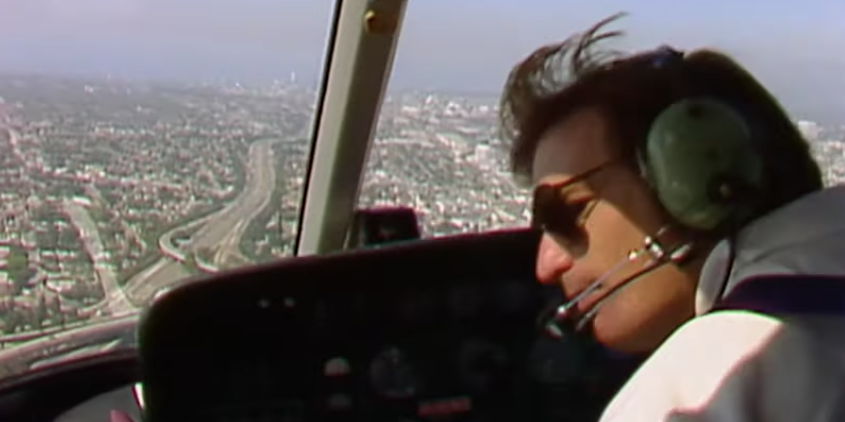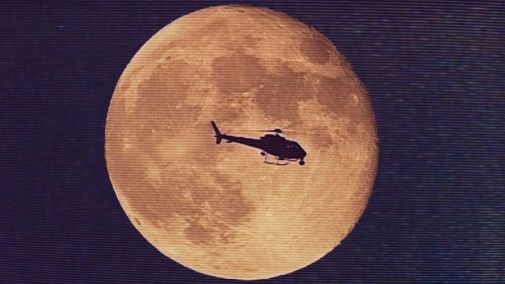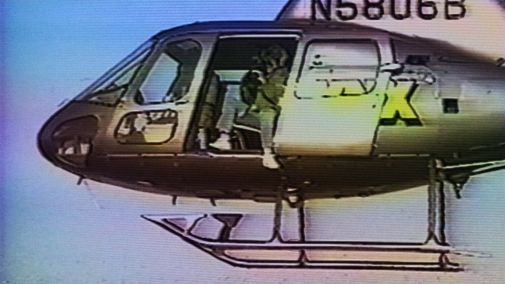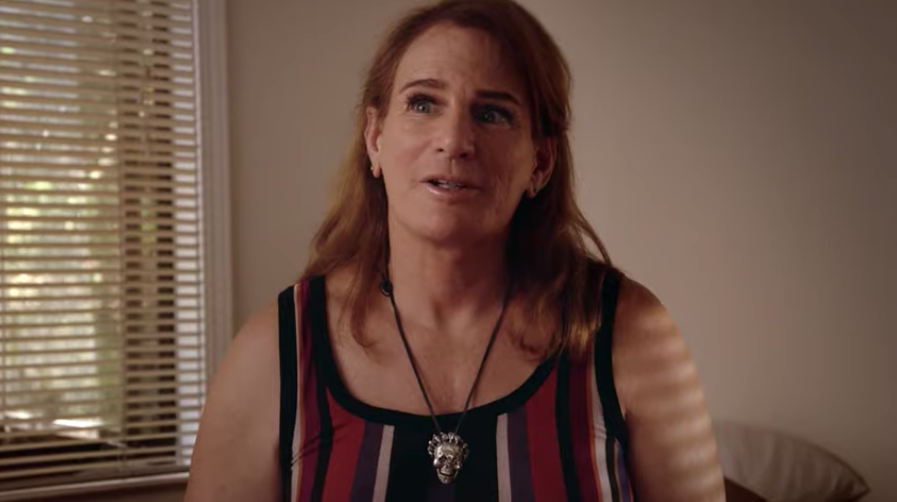Doc Corner: A 'Whirlybird' over Los Angeles
 Friday, August 6, 2021 at 3:40PM
Friday, August 6, 2021 at 3:40PM By Glenn Dunks

There is a shot about 30 minutes in Matt Yoka’s Whirlybird that made me gasp. Not necessarily because of how shocking or surprising it is, but because of the decision-making process that must have occurred to choose to include it. It took what was up until that point a nice trip through Los Angeles news history and made me view the rest of this documentary through different eyes. The shot in question is live news footage taken from a helicopter over L.A. with a network chyron that reads "Rock Hudson Battles AIDS” while footage shows the actor being transported to hospital surrounded by medical staff.
It is hardly surprising that anybody would film this. What is surprising is that Yoka’s film doesn’t seem all that fussed about addressing it. In fact, at one point news camera hounding of Madonna and Sean Penn is used as a journalistic punchline in an effort to boost the image of what were essentially paparazzi with a bigger budget. Which speaks to the whole film, too, really...

Whirlybird is the story of once husband-and-wife team Zoey (nee Bob, Zoey transitioned around 2013) and Marika Tur, pioneers of Nightcrawler style news reporting who took to the air in a helicopter of Los Angeles and revolutionised how Americans digested the news. It’s a fascinating subject and one that finds its subjects up close and personal with a variety of major news stories. But just like a lazy piece of reporting, Whirlybird ignores hard truths at its core, avoiding or obfuscating with little time spent on accountability or, hell, even just regular old contemplation. It's a bit like a journalist wasting interview word space on describing the appetizers.
Now retired, Zoey’s past life was one of almost pathological thrill-seeking to, as she maybe alludes, disguise the internal hatred that was brewing inside of her. The Turs worked together, building a business from the air as they captured high speed chases, plane crashes and riots. The film is quick to explore this side of their life, the excitement and the domestic clashes of ego with the occasional dalliance into how this affected their home life with two children. But what the film is less interested in exploring is the broader context for what their work meant and the effect it had on the people they were filming and the stories they were beaming into people’s homes of a daily basis.
At one point, Zoey calls herself a “war correspondent at home” in a rather self-deluded response to the perception that Los Angeles was “changing” in the face of Rodney King and the L.A. riots. Additional footage features the Turs glibly state, “let the riots begin" as the verdict is delivered. Old footage from a family vacation to Hawaii yields some self-reflection, probed by Marika, while, retrospectively, Zoey does briefly muse on how this particularly nose-deep reporting was affecting themselves on a deeper level of prejudice. This is particularly in response to the violence they filmed during the race riots of 1992, during which Zoey is heard on live television stating about the black rioters that, “These people are not people.” Which is an extraordinary thing to say, but the dog whistles are never probed with any great depth.

That’s probably because throughout the entire film, Whirlybird comes off as distinctly being too close to its subject. This continues through the film’s final stretches where Yoka (in his feature debut as a director) dives further into Zoey’s self-identification as a transgender woman. This self-realization—after having attended the Burning Man festival in the California desert—conflates her abusive and angrily violent demeanour to Marika as a response to her as-yet unexplored gender expression. I’m not sure if this is dangerous or not, but it is indicative of the film’s lack of deeper examination. The phrase “toxic masculinity” is used once, but there is much here left off the table and I suspect it would take a film with a more critical, probing eye to really get into the tougher questions the footage poses.
Zoey Tur has been in the news in recent years for altercations with Ben Shapiro (ugh) and claims her daughter, an MSNBC news anchor, is transphobic, although neither story appears here (like others, Katy does use incorrect pronouns throughout). There are passages that are well-edited, and the footage itself is always going to be interesting and shows Los Angeles as a changing, evolving city. Zoey appears to be forthcoming and open about their own evolution, but Whirlybird is hesitant to follow her. We see slivers, like cutaways during a news broadcast. Considering much of the Tur’s footage has gone on to be featured in far more critical documentaries, it seems like somewhat of a waste.

Release: Out today in limited theatres through Greenwich Entertainment in Los Angeles, New York, Chicago, Cleveland, Columbus, Denver, Seattle and Vancouver, WA, as well as digitally via iTunes and Prime.
Oscar chances: I suspect not likely, although if they were to submit to the Emmys instead (remember, rule changes mean you can only submit to one or the other) they'd likely have better luck given the subject.
 Doc Corner,
Doc Corner,  LGBTQ+,
LGBTQ+,  Los Angeles,
Los Angeles,  documentaries
documentaries 


Reader Comments (1)
Hi glenn